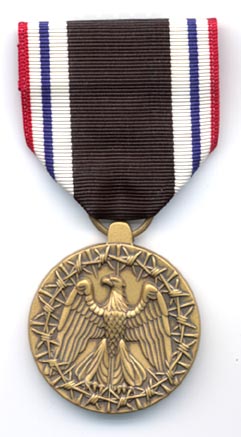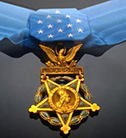American POW History
Check out many of our original Bio's for POW's. CombatVets Network
Send Bio information and photos, E-mail to
Biographer@Combatvets.net for publishing.Since World War I, more than 142,000 Americans, including 85 women, have been captured and interned as POWs. Not included in this figure are nearly 3,000 Americans who were lost or never recovered. Only one fifth of America's former POWs since World War I are still living (about 22,641). More than 90% of living former POWs were captured and interned during World War II. About 15,367 former POWs are in receipt of compensation for service-connected injuries, diseases, or illnesses.
In 1981, Congress passed Public Law 97-37 entitled "Former Prisoners of War Benefit Act." This law accomplished several things. It established an Advisory Committee on Former Prisoners of War and mandated medical and dental care. It also identified certain diagnoses as presumptive service-connected conditions for former POWs. Subsequent public laws and policy decisions by the Secretary of Veterans Affairs have added additional diagnoses to the list of presumptive conditions.
What Are the Presumptive Conditions for Former POWs?
Today, former POWs are generally entitled to a presumption of service-connection for seven diseases, regardless of the length of captivity, if manifested to a degree of 10 percent or more after discharge or release from active military, naval, or air service. These diseases are:
-
Disabilities Subject to a Presumption of Service Connection for Former POWs
Former POWs who are diagnosed with any of the conditions in the categories below are presumed to be service-connected for those conditions, regardless of their length of time in captivity:
- Osteoporosis (on or after October 10, 2008, if the POW has PTSD)
- Neuro-Psychiatric, including psychosis, dysthymic disorder (Depressive Neurosis), any of the Anxiety States (e.g., PTSD)
- Cold Injury
- Traumatic Arthritis
- Stroke
- Heart Disease
The following additional conditions are presumed to be service-connected for former POWs who were captive for 30 days or more:
- Osteoporosis (on or after September 28, 2009)
- Nutritional deficiencies, including avitaminosis, beriberi, malnutrition, and pellagra
- Helminthiasis
- Peripheral Neuropathy
- Digestive disorders, including peptic ulcer disease, chronic dysentery, irritable bowel syndrome, and cirrhosis of the liver
How Should a Former POW Apply for VA Compensation?
- Former POWs can apply for compensation for their service-connected injuries, diseases, or illnesses by completing VA Form 21-526, Veterans Application for Compensation and/or Pension. They can also apply online athttp://vabenefits.vba.va.gov/vonapp/main.asp.
Are There Medical Benefits for Former POWs?
Yes. Additionally, the VA health care system affords priority treatment for former POWs. Those who have a service–connected disability are eligible for VA health care. This includes hospital, nursing home, and outpatient treatment. Former POWs who do not have a service-connected disability are eligible for VA hospital and nursing home care – without regard to their ability to pay. They are also eligible for outpatient care on a priority basis – second only to veterans with service-connected disabilities.
While former POWs are receiving treatment in an approved outpatient treatment program, they are eligible for needed medicines, glasses, hearing aids, or prostheses. They are also eligible for all needed dental care. There is no co-payment requirement for former POWs at VA pharmacies.
Are There Benefits for Survivors of Former POWs?
- Yes. The major benefit is Dependency and Indemnity Compensation (DIC) which is a monthly benefit payable to the surviving spouse (and the former POW’s children and parents in some cases) when the former POW:
- was a service member who died on active duty; or
- died from service-related disabilities; or
- died on or before September 30, 1999 and was continuously rated totally disabled for a service connected condition (including individual unemployability) for at least 10 years immediately preceding death; or
- died after September 30, 1999, and was continuously rated totally disabled for a service-connected condition (including individual unemployability) for at least 1 year immediately preceding death.
DIC is terminated for a surviving spouse who remarries, but can be resumed if the remarriage ends in death, divorce, or annulment. However, a surviving spouse who remarries on or after attaining age 57, and on or after December 16, 2003, can continue to receive DIC.
Are There Other Benefits for Former POWs and Their Dependents/Survivors?
The following are other significant VA benefits to which certain veterans may be entitled: disability pension, medical care, education and training, home loan guaranty, and burial benefits. Certain disabled veterans may be eligible for vocational rehabilitation and employment services, insurance, clothing allowance, special adapted housing assistance, and specially adapted automobile equipment. Certain dependents/survivors may be entitled to health care, death pension, education and training, home loan guaranty, and burial in a national cemetery. See other VA fact sheets on those benefits, or contact VA for more information.
Is Special Assistance Available to Former POWs?
Each VA regional office has a coordinator for former POWs. Any former POW who needs special assistance should ask to speak to the Former POW Coordinator. Additional former POW information is available at
http://www.vba.va.gov/bln/21/Benefits/POW/index.htm



